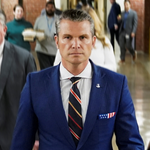So the first presidential debate is history and the reviews are in — the gist of which is that the thing was basically a tie. Democrats mildly preferred Barack Obama’s performance, though wish that he’d gone more forcefully for John McCain’s jugular. Republicans argued, to the contrary, that McCain won the night, though they did so without much passion or even firm conviction. The lack of a singular defining moment helps explain why the verdicts were so tepid and squishy. Neither candidate landed anything resembling a knockout blow, so partisans from both sides were left to fall back on their preconceptions and predispositions in analyzing the event.
And maybe by the time you’re finished reading this, you’ll say the same thing about me. But here goes: Barack Obama emerged clearly victorious and for one simple reason — he did what he set out to do, and John McCain did not.
What were Obama’s goals last night? The answer is straightforward: to emerge at the end of 90 minutes looking more presidential than when he started, and to project an aura of confidence and competence on foreign policy and national security. And these things he did in spades. Sure, he rarely drew blood to the extent that many of us thought he might against McCain, but his signal sound bite regarding the Iraq war — “You said we knew where the weapons of mass destruction were. You were wrong. You said that we were going to be greeted as liberators. You were wrong. You said that there was no history of violence between Shiite and Sunni. And you were wrong” — was plenty strong and went to the heart of his argument that, for all his rival’s experience, McCain’s judgment is very far from perfect.
And what of McCain’s objectives? These too were crystal clear: He sought to paint Obama as dangerously naïve and out of his depth in the ways of world affairs. It’s fair to say that McCain scored a few points here, especially in emphasizing his direct engagement on the global stage. But his central point, repeated ad nauseum and nearly ad infinitum — “I’m afraid Senator Obama doesn’t understand the difference between a tactic and a strategy … What he doesn’t understand … I don’t think that Senator Obama understands … What Senator Obama doesn’t seem to understand … He doesn’t understand … Senator Obama still doesn’t quite understand, or doesn’t get it” — fell as flat as some of his indecipherable insider jokes and senatese. It fell flat because, up there onstage, Obama didn’t come across as a guy who didn’t understand. You could disagree with his point of view, but there was no fumbling or uncertainty or lack of sophistication.
In the absence of a big, defining moment, the crucial question is what the media filter now does with the debate. And my guess is that it will focus on McCain’s demeanor, and not to his advantage. McCain’s people believe he came across as emphatic and impassioned. But the press is focusing instead on his inability or unwillingness to make eye contact — even once! — with Obama, interpreting it as a reflection of his abject disdain for his opponent. Maybe I’ll be proven wrong, but I’m betting that this is what Saturday Night Live will target on tonight’s show. And if that proves true, it may do as much as anything to harden a conventional wisdom that McCain was the stylistic loser in a debate where there was no clear substantive winner.
It’s a cliché to say that a tie last night for Obama was actually a win. But it also happens to be correct. Not just because foreign affairs is supposed to be McCain’s strong suit and Obama’s area of vulnerability, but because of the broader dynamics of the race. As we’ve seen over and over since the general election started, when the campaign is at equilibrium, Obama runs ahead of McCain by somewhere between three and seven points — which is why McCain and his people are constantly, and somewhat desperately, trying to unsettle that equilibrium with gimmicks, shocks, and stunts. The selection of Palin. The “suspension” of McCain’s campaign. The transparently bogus threat of bailing out of the first debate unless a bailout plan for the financial system was agreed to on Capitol Hill. The problem with these gambits is diminishing returns: Each one has less effect than the last. It’s possible, of course, that McCain and his adjutants will figure out some new way to turn the campaign on its head in the two remaining debates. (Literally setting himself on fire, perhaps?) But having failed to accomplish that last night only raises the stakes for him. And the higher the stakes — and hence the expectations — the more likely that McCain, in the end, will come up short.





























